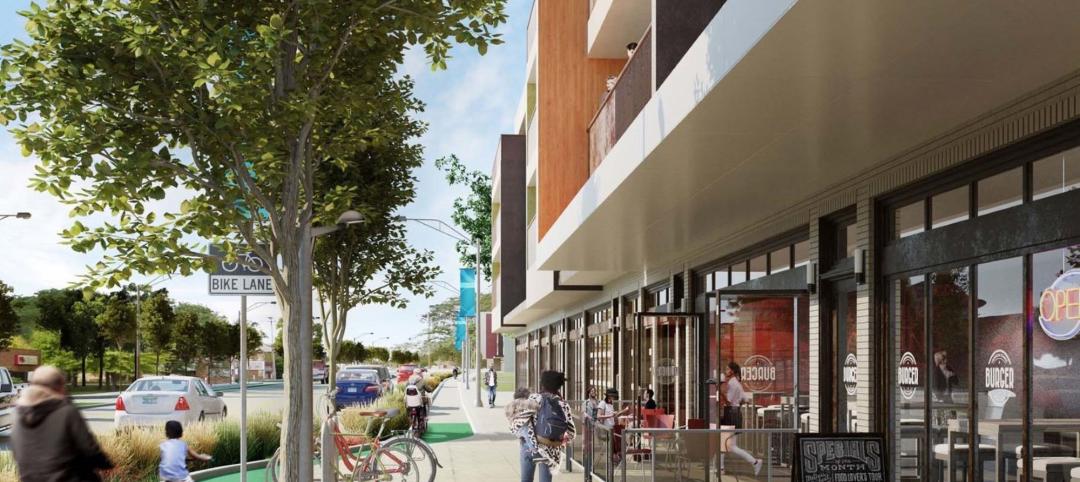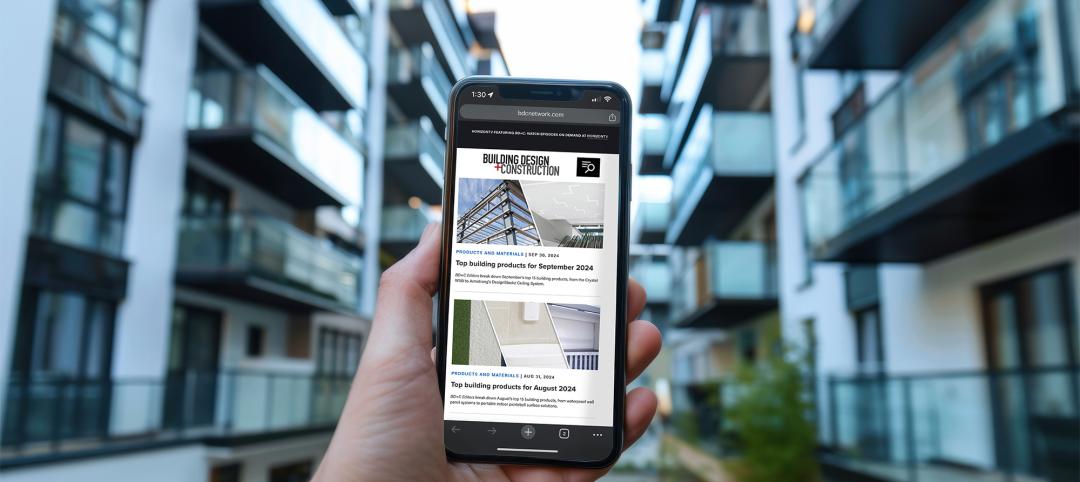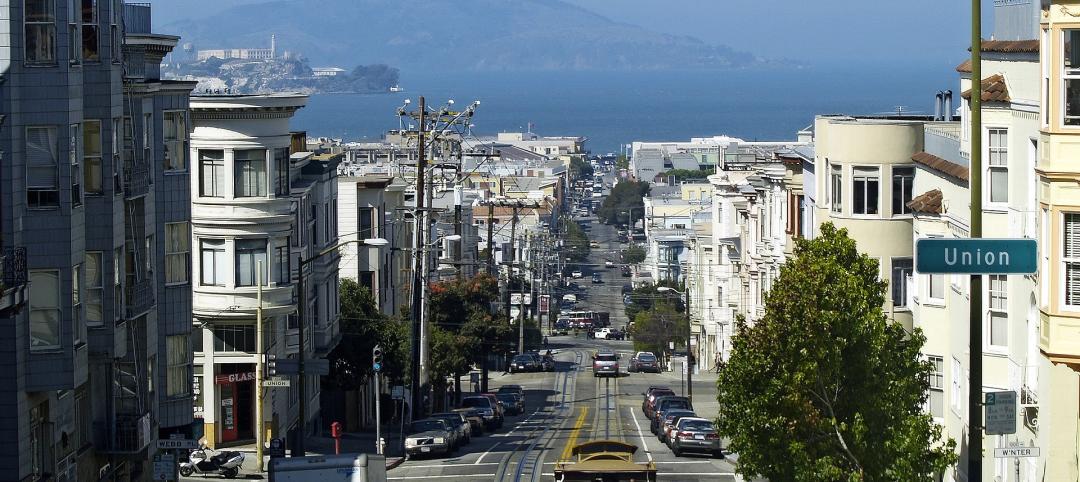Modo, the first modular apartment building in Washington, D.C. has begun construction. In a period of only eight days 44 custom designed modular boxes shipped from Pennsylvania were lifted into place by crane to create 16 of Modo’s 17 three-bedroom apartments.
The modules arrived onsite 80% finished. Each three-bedroom Modo apartment features built-in custom closets, shelving, desks meant to facilitate remote working, and a spacious living room with a pre-installed jumbo flat-screen TV.
“We were looking for more efficient and environmentally-friendly alternatives to typical construction types,” said Grant Epstein, President of Community Three, the project’s developer, in a release. “Modular construction can reduce construction time by almost one-third, while generating far less onsite construction waste. Construction components typically exposed to the elements – such as windows and wood framing – are built with higher quality because they are assembled indoors. As a result, these modular units offer superior insulation, weather barriers, sound attenuation, and indoor finishes compared with those constructed traditionally.”
The community is designed to appeal to the twenty-somethings of Generation Z, with enough bedrooms to accommodate multiple roommates. An automated entry system will allow tenants to use a smartphone app to access both the building and their apartments.
In addition to the apartments, a concrete-and-steel podium, under construction since April, will house the building’s lobby and a 3,000-sf street-level retail space that can provide over 100 outdoor cafe seats. The lobby will be furnished with a seating area for relaxing, eating, and remote working. A green roof deck with seating and grilling areas will also be included, along with a single penthouse apartment with a private outdoor terrace that is being built on the roof level.
Urban Pace will begin pre-leasing the apartments in March, 2021. Community Three is partnering with Washington, DC-based Rooney Properties on the project. The team worked with the Modular Mobilization Coalition to select Philadelphia-based VBC Construction as modular contractor. VBC in turn partnered with Scranton, PA-based Simplex Homes as the modular fabricator. The manufacturing team worked closely with DC-based project architect Eric Colbert & Associates to ensure seamless integration of market focus and construction methodology.
Related Stories
MFPRO+ New Projects | Oct 30, 2024
BIG’s One High Line finally reaches completion in New York City’s West Chelsea neighborhood
One High Line, a luxury residential project spanning a full city block in New York’s West Chelsea neighborhood, reached completion this summer following years of delays related to investor lawsuits.
MFPRO+ New Projects | Oct 30, 2024
Luxury waterfront tower in Brooklyn features East River and Manhattan skyline views
Leasing recently began for The Dupont, a 41-story luxury rental property along the Brooklyn, N.Y., waterfront. Located within the 22-acre Greenpoint Landing, where it overlooks the newly constructed Newtown Barge Park, the high-rise features East River and Manhattan skyline views along with 20,000 sf of indoor and outdoor communal space.
Multifamily Housing | Oct 28, 2024
A case for mid-rise: How multifamily housing can reshape our cities
Often referred to as “five-over-ones,” the mid-rise apartment type is typically comprised of five stories of apartments on top of a concrete “podium” of ground-floor retail. The main criticism of the “five-over-one” is that they are often too predictable.
Adaptive Reuse | Oct 22, 2024
Adaptive reuse project transforms 1840s-era mill building into rental housing
A recently opened multifamily property in Lawrence, Mass., is an adaptive reuse of an 1840s-era mill building. Stone Mill Lofts is one of the first all-electric mixed-income multifamily properties in Massachusetts. The all-electric building meets ambitious modern energy codes and stringent National Park Service historic preservation guidelines.
MFPRO+ News | Oct 22, 2024
Project financing tempers robust demand for multifamily housing
AEC Giants with multifamily practices report that the sector has been struggling over the past year, despite the high demand for housing, especially affordable products.
Products and Materials | Oct 17, 2024
5 multifamily tech products for your next project
Multifamily housing and technological upgrades go hand-in-hand. From the rise in electric vehicle charging needs to the sophistication of smart home accessories, tech products are abound in the multifamily space.
Codes and Standards | Oct 16, 2024
North Carolina’s code policies likely worsened damage caused by Hurricane Helene
The North Carolina Legislature’s rejection of building code updates likely worsened the damage caused by Hurricane Helene, code experts say. Over the past 15 years, lawmakers rejected limits on construction on steep slopes, which might have reduced the number of homes destroyed by landslides.
MFPRO+ News | Oct 16, 2024
One-third of young adults say hurricanes like Helene and Milton will impact where they choose to live
Nearly one-third of U.S. residents between 18 and 34 years old say they are reconsidering where they want to move after seeing the damage wrought by Hurricane Helene, according to a Redfin report. About 15% of those over age 35 echoed their younger cohort’s sentiment.
Student Housing | Oct 9, 2024
University of Maryland begins work on $148 million graduate student housing development
The University of Maryland, in partnership with Campus Apartments and Mosaic Development Partners, has broken ground on a $148.75 million graduate student housing project on the university’s flagship College Park campus. The project will add 741 beds in 465 fully furnished apartments.
MFPRO+ News | Oct 9, 2024
San Francisco unveils guidelines to streamline office-to-residential conversions
The San Francisco Department of Building Inspection announced a series of new building code guidelines clarifying adaptive reuse code provisions and exceptions for converting office-to-residential buildings. Developed in response to the Commercial to Residential Adaptive Reuse program established in July 2023, the guidelines aim to increase the viability of converting underutilized office buildings into housing by reducing regulatory barriers in specific zoning districts downtown.

















